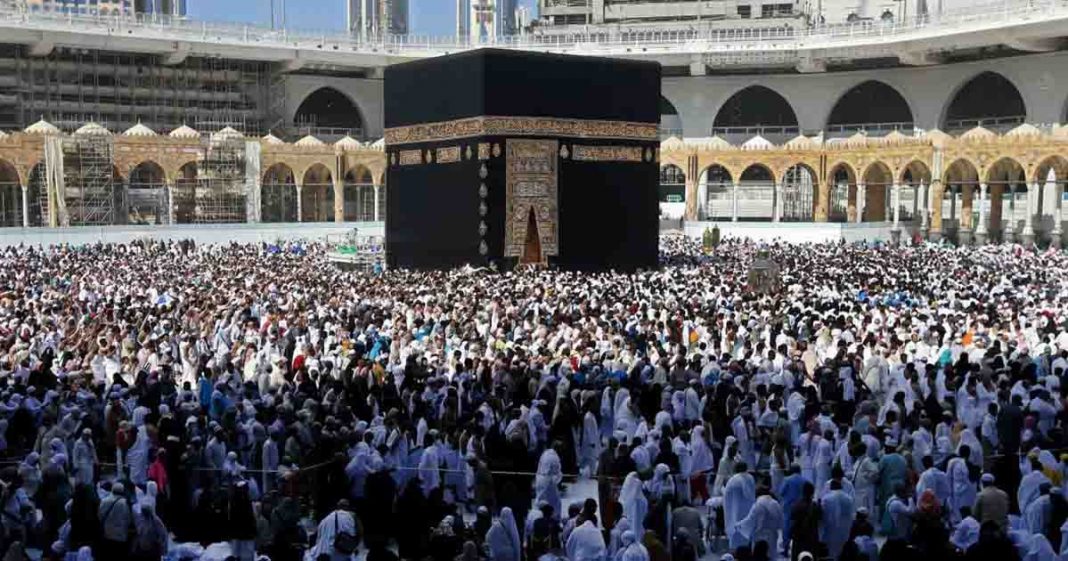Saudi Arabia on Monday announced it would hold a “very limited” hajj this year owing to the coronavirus pandemic, with pilgrims already in the kingdom allowed to take part.
The decision, fraught with political and economic peril, comes as Saudi Arabia struggles to contain the virus amid a new spike in daily cases and deaths.
Limited Hajj to be held due to coronavirus with fewer pilgrims
“It was decided to hold the pilgrimage this year with very limited numbers… with different nationalities in the kingdom,” the official Saudi Press Agency said, citing the hajj ministry.
Read more: Hajj 2020: Is Saudi Arabia considering limiting the number of pilgrimages?
The hajj, a must for able-bodied Muslims at least once in their lifetime, represents a major potential source of contagion as it packs millions of pilgrims into congested religious sites.
#Statement issued by the Ministry of Hajj and Umrah regarding Hajj of 2020 pic.twitter.com/UGCShFZw1n
— Foreign Ministry 🇸🇦 (@KSAmofaEN) June 22, 2020
Any decision to limit the event risks annoying Muslim hardliners for whom religion trumps health concerns.
A full-scale hajj, which last year drew about 2.5 million pilgrims, was unlikely after authorities advised Muslims in late March to defer preparations due to the fast-spreading disease.
Scrutiny over revenue of Saudi royal family
A watered-down hajj would represent a major loss of revenue for the kingdom, which is already reeling from the twin shocks of the virus-induced slowdown and a plunge in oil prices.
According to the recent estimates, the total wealth of Saudi Arabia’s royal family has reached $1.4 trillion. This estimated wealth makes the Saudi royal family 16 times richer than the British monarchy. Also, Saudi’s are the richest families among all the monarchs and also the richest family in the world.
Read more: Saudi royal family’s wealth reached $1.4 trillion mark
The Saudi royal family lives an enviable and opulent lifestyle. And they have severe criticism several times for extravagant spending and ultra-luxurious lifestyle. Saudi Arabia’s royal family garners the attraction of world media for their spendthrift ways. From owning private jets to palaces and yachts, Saudi Arabia’s royal family is renowned for using furniture made of gold.
Now that the nation is suffering from the economic impacts of coronavirus, they have received more criticism for their extravagant lifestyle. The loss of revenue from a limited Hajj due to coronavirus may further add to the perils of the common people.
It could also trigger renewed scrutiny of the Saudi custodianship of Islam’s holiest sites — the kingdom’s most powerful source of political legitimacy.
A series of deadly disasters over the years, including a 2015 stampede that killed up to 2,300 worshippers, has prompted criticism of the kingdom’s management of the hajj.
Countries pulling out of Hajj due to coronavirus
Earlier this month, Indonesia, the world’s most populous Muslim nation, emerged as one of the first countries to withdraw from the pilgrimage after pressing Riyadh for clarity, with a minister calling it a “very bitter and difficult decision”.
Senegal and Singapore followed suit with similar announcements.
Malaysia too pulled out of the annual Islamic pilgrimage to Mecca over coronavirus fears days after neighbouring Indonesia, the world’s biggest Muslim-majority nation, also withdrew. Malaysia pulling out of Hajj is a troubling development, and may throw Hajj 2020 in the doldrums, as the two more established Muslim powers have withdrawn their citizens from the pilgrimage.
Read more: Malaysia pulls out of Hajj due to coronavirus fears
Religious Affairs Minister Zulkifli Mohamad Al-Bakri said it was not safe for the 31,600 pilgrims from Malaysia who had been due to go this year to take part due to the virus.
“This was a heavy decision to make,” he said, adding that those affected would be able to go on the hajj next year instead.
In Malaysia, a country of 32 million where about 60 percent are Muslims, the devout typically wait for years for the opportunity to perform the hajj.
Mosques reopened
Muslims around the world breathe a sigh of relief as Saudi Arabia opens mosques within its borders, including the Masjid-e-Nabavi, one of Islam’s two holiest sites in Medina. Mask-clad worshippers flocked to Saudi mosques that reopened nationwide Sunday, except in the holy city of Mecca, more than two months after congregational prayers were halted under a coronavirus-triggered lockdown.
They had been instructed to bring their own prayer mats and to perform the cleansing ritual, or ablution, at home, instead of in mosque grounds.
Read more: Saudi Arabia reopens mosques including Masjid-e-Nabavi
“Worshippers rushed to the home of God to perform their obligatory duty (prayers) after the reopening of mosques,” the ministry of Islamic affairs said on Twitter.
After Saudi Arabia reopened mosques, the ministry posted photos showing mosques and many worshippers wearing face masks and keeping standard minimum distance in between fellow worshippers.
Authorities have instructed mosques to avoid crowding and the distribution of food, drinks, incense and miswak twigs used to clean teeth, according to the ministry.
“My feelings are indescribable. We are so happy. Thank God we are back in (His) house,” Abdulrahman, 45, told AFP at Al-Rajhi mosque.
AFP with additional input by GVS News Desk
What are your views on this? Share with us in the comments bar below.














